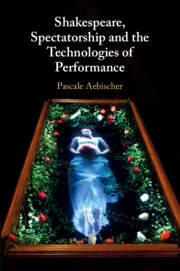Book contents
- Shakespeare, Spectatorship and the Technologies of Performance
- Shakespeare, Spectatorship and the Technologies of Performance
- Copyright page
- Contents
- Figures
- Tables
- Acknowledgements
- How to Read This Book
- Introduction
- Part I Candlelight and Architecture at the Sam Wanamaker Playhouse
- Part II Digital Technologies and Early Modern Drama at the National Theatre and the RSC
- Part III ‘Invisible’ Technology and ‘Liveness’ in Digital Theatre Broadcasting
- Concluding Most Obscenely: Offstage Technophelias
- Bibliography
- Index
Concluding Most Obscenely: Offstage Technophelias
Published online by Cambridge University Press: 10 April 2020
- Shakespeare, Spectatorship and the Technologies of Performance
- Shakespeare, Spectatorship and the Technologies of Performance
- Copyright page
- Contents
- Figures
- Tables
- Acknowledgements
- How to Read This Book
- Introduction
- Part I Candlelight and Architecture at the Sam Wanamaker Playhouse
- Part II Digital Technologies and Early Modern Drama at the National Theatre and the RSC
- Part III ‘Invisible’ Technology and ‘Liveness’ in Digital Theatre Broadcasting
- Concluding Most Obscenely: Offstage Technophelias
- Bibliography
- Index
Summary
Far from acting as unequivocal barriers to direct interaction, this book has argued that technologies of performance can be the means of generating intense and individual experiences of theatrical presence and co-creation that have potential ethical force. Technologies can trigger involved modes of spectatorship demanding computational forms of viewing that appeal to hyperattentive digital natives and enmesh the viewer with the onstage fiction through cognitive and affective prompts. The model spectators of Dromgoole’s SWP productions, like those of Doran’s magic illusionist masque or the remote viewers of the RSC’s Hamlet, are privileged by the performance technologies that offer these spectators, at crucial moments, an experience of spectatorial plenitude or Barthesian plaisir resulting from an enjoyment of the aesthetic coherence of the stage image coupled with an appreciation of an artistry rooted in historical continuity. But even for these spectators, that experience of plenitude is precarious, constitutes an ethical choice in its own right and hinges on the deliberate blocking out of other prompts that demand a more responsible/response-able mode of spectatorship. Eccentric sightlines in the SWP – just like live video giving partial access to offstage zones, social media that create offstage interactive worlds, double event aesthetics and disorienting camerawork that obscures or re-frames the focal point of a scene – act as technological interfaces that require that spectators act responsibly/response-ably, both individually and as part of a collective audience that contributes to the creation of the theatrical event.
- Type
- Chapter
- Information
- Shakespeare, Spectatorship and the Technologies of Performance , pp. 207 - 218Publisher: Cambridge University PressPrint publication year: 2020



